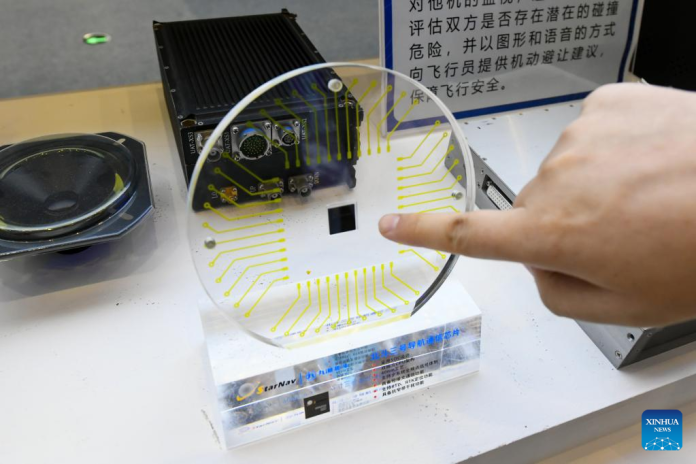By Zhong Sheng, People’s Daily
In the early morning of August 10, Beijing time, the White House issued an executive order on addressing investment, restricting U.S. entities from investing in China’s semiconductor, microelectronic, quantum information technology and artificial intelligence sectors.
The executive order, which has long been in the making, has been widely questioned, criticized and opposed for its negative consequences.
Due to its wrong China policy, the U.S. has failed to restrain its impulse for economic coercion and technological hegemony. This once again shows that the U.S., obsessed with maintaining hegemony for selfish interests, has become a saboteur of international economic and trade order and the stability of global industrial and supply chains.
The U.S. has introduced the executive order to maintain its hegemonic status by tripping up China.
In recent years, China-U.S. economic ties have faced serious obstacles. The root cause lies in the U.S. attempt to deprive China of its right to develop, handle economic issues with a zero-sum mentality, and undermine normal economic and trade exchanges with political manipulation.
The current U.S. administration has not only continued imposing tariffs on Chinese exports, but also intensified the blockade and containment of China, repeatedly upgrading export controls and stirring up investment reviews against China. The U.S. attempts of “decoupling and breaking the chain,” building “exclusive yards with high walls” and “de-risking” seriously violate the principles of market economy and fair competition.
Ironically, while introducing the investment review, the U.S. has claimed it will maintain a long-term commitment to open investment. Such self-contradictory rhetoric only exposes its hypocrisy, and can by no means cover up its attempt to hinder open cooperation or appease U.S. companies suffering losses due to the executive order.
In whitewashing the investment review, the U.S. once again brought up the excuse of “protecting national security.” But facts in recent years have made it clear that the so-called “national security threats” referred to by the U.S. are a catch-all excuse with blurred boundaries.
Under U.S. political manipulation, a globally popular video-sharing app, cargo handling equipment operating at ports, U.S. companies exploring the Chinese market, or Chinese enterprises investing in the U.S., have all been labeled as “national security threats.”
Even Chinese companies sharing technologies with U.S. partners have been depicted as causing U.S. “reliance” on Chinese technologies, and thus seen as threats. The U.S.’ pan-securitization and pan-politicization essentially amounts to deglobalization and “de-sinicization.”
By constantly politicizing, instrumentalizing and weaponizing tech and trade issues in China-U.S. economic relations, the U.S. has not only damaged the interests of both countries, but also seriously disrupted international economic and trade order and destabilized global industrial and supply chains, harming the interests of the whole world.
Currently, the global economic recovery faces formidable difficulties. The U.S. has obstructed global economic and trade exchanges and cooperation, and coerced its allies to join its technology blockade against China. Its rampant black hand of hegemony has aroused strong concerns and high alert in the international community.
The International Monetary Fund (IMF) has warned that “a fragmented global economy is likely to be a poorer one.”
The U.S. believes that by restricting high-tech investment in China, it can hinder China’s sci-tech innovation and impede the latter’s development and progress. Such thinking is too naive.
In today’s world of close global economic and technological connections, no country can monopolize sci-tech innovation and development advantages.
China has become a global highland of sci-tech innovation, and its confidence in accelerating self-reliance in high-level science and technology remains firm. The more sanctions the U.S. imposes on China, the harder China will strive to accelerate its own technological progress.
With the advantage of the super-sized market, China adheres to expanding high-level opening up, and constantly optimizes the business environment, making it more attractive than ever to foreign investors.
According to a report by the United Nations Conference on Trade and Development (UNCTAD), foreign direct investment (FDI) flows to China hit a record $189.1 billion in 2022.
Against the continued downward pressure on global FDI this year, the overall scale of China’s actual use of foreign investment has remained stable in the first half, with improved quality of investment.
The U.S. restriction on its own entities’ investment in China is forcing them to give up opportunities in China, a move that is doomed to be unpopular.
Containment and suppression cannot halt China’s development. Disrupting normal international economic and trade cooperation will only exacerbate its own problems and challenges facing the world.
To find the right approach to handling China-U.S. economic ties, the U.S. must break mental shackles and abandon the distorted mentality of viewing China’s development as a threat. It should earnestly fulfill its commitment of no intention to “decouple” from or impede China’s economic development, and stop politicizing, instrumentalizing and weaponizing economic, trade and technology issues. Only in this way can a sound environment be created for China-U.S. economic and trade cooperation. (Zhong Sheng is a pen name often used by People’s Daily to express its views on foreign policy and international affairs.)













